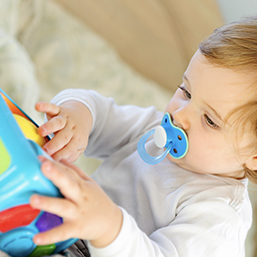
As parents, we want nothing but the best for our children. From their first steps to their first words, we cheer them on every step of the way. But sometimes, those little habits like thumb-sucking, pacifier use, or finger-chewing can become a source of concern. While these habits are common among young children, they can affect oral health if they persist for too long. As a pediatric dentist, I have seen them all. Here is some advice I have given to parents over the years on managing these habits.
Understanding the habit. The first step in addressing any habit is to understand it. These habits often serve as a source of comfort and security for children. They are entirely natural for infants and young children and can help them cope with stress, anxiety, or even boredom. However, if these habits continue beyond the toddler years, they can lead to dental issues.
Know when it's a problem. So when should you start worrying about your child's finger-sucking or pacifier use? Most children naturally outgrow these habits between the ages of two and four–this generally coincides with the start of preschool. However, if they persist beyond this point, it's essential to address the issue. The longer these habits continue, the higher the risk of dental problems, including misaligned teeth and speech issues.
Gentle guidance. To help your child break the habit, it's crucial to approach the situation with patience and understanding. I recommend using gentle guidance rather than coercion or punishment. Offer praise and encouragement when your child abstains from the habit, and reassure them that you're there to support them. Positive reinforcement goes a long way in motivating your child to make a change.
Identify triggers. One of the most effective ways to manage these habits is to identify the triggers that lead to thumb-sucking, pacifier use, or finger-chewing. I suggest observing your child's behavior to pinpoint the situations or emotions that prompt the habit. Once you identify these triggers, you can work together to find alternative ways to address them. This approach helps your child learn healthier coping mechanisms.
Create a reward system. To motivate your child to stop the habit, consider creating a reward system. I recommend using a sticker chart or a similar method to track your child's progress, but make sure your child is ready to kick the habit, otherwise your efforts will fail. It takes 30 days to make or break a habit, so use a calendar. Offer small rewards for each milestone they achieve, and make sure the rewards are related to their interests, such as extra playtime or a favorite treat. This positive reinforcement can be a powerful incentive for breaking the habit.
Engage in open communication. Your child may not fully understand the implications of their habit, so it's crucial to have an open and honest conversation with them. I suggest explaining the potential dental issues and the importance of stopping the habit. Be sure to use age-appropriate language and keep the conversation positive and reassuring. Encourage your child to ask questions and share their feelings throughout the process.
Gradual weaning. For many children, quitting a long-standing habit can be challenging. I recommend a gradual weaning approach, especially for pacifier use. Start by limiting pacifier time to certain situations, not outside the house, then move to not outside the bedroom, followed by not out of bed, and then, finally, not at all. This helps your child adapt to the change more easily. For thumb-sucking or finger-chewing, you can try using gloves or band-aids during certain times to make the habit less accessible.
Seek professional guidance. If your child's habit persists despite your efforts, it may be time to seek professional guidance. The importance of involving a pediatric dentist or orthodontist, who can provide specialized advice and treatment options, cannot be over-emphasized. I rarely recommend dental appliances to discourage the habit. My approach is to help parents to create and implement a reward system.
Be a role model. Children often mimic the behavior of those around them, so it's essential for parents to set a positive example. I advise parents to avoid behaviors that might encourage finger-sucking or pacifier use in their children. This includes observing and curbing your own habits. By demonstrating healthy habits, you can inspire your child to follow suit.
Patience is key. Breaking the habit of finger-sucking, pacifier use, or finger-chewing may take time and patience. It's essential to remember that every child is different, and what works for one may not work for another. The goal should be for the process to be as stress-free as possible for both you and your child.
Your local pediatric dentist is an invaluable resource in helping your child transition away from these habits. Don't hesitate to reach out for their expertise and guidance. With love, understanding, and the right approach, you can support your child in breaking these habits and ensuring their oral health for a lifetime.
Dr. Kari Badwi is a pediatric dentist and owner of BabyTooth Pediatric Dental Practice.
See our related articles:
Calgary’s Child Magazine © 2024 Calgary’s Child